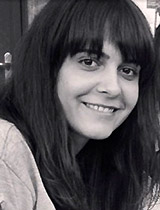BSc Chemistry graduate Berivan Esen to carry out research into life on Mars with NASA.
Berivan Esen, who studied BSc (Hons) Chemistry, has won an internship with the famous space agency, where she will investigate techniques to analyse perchlorates – naturally occurring salts that could hold the key to unlocking the story of life on the red planet.
The talented student, who is now studying for a Master’s degree in Toronto, will work at NASA’s Ames research base, in California’s ‘Silicon Valley’, for two months with the possibility of an extension.
“I’ve always had an interest in astrobiology but I had never met anyone who had research experience in the area,” said Berivan. “However, at London Met my lecturer, Dr Don Green, recognised my enthusiasm for the subject and introduced me to Dr Kevin Devine, who had worked on the issue of perchlorates on Mars.
“Dr Devine introduced me to a project which remains an important topic in Martian exploration and astrobiology in general. I will be pursuing this same project at NASA, and because I worked on this as an undergraduate, the supervisor there was enthusiastic about taking me on.”
Berivan’s achievement reflects her hard work and the quality of teaching and support available at London Met, and she credits the staff in the Faculty as helping in her success.
“The faculty members who run the BSc Chemistry course have always supported my interests and career development,” said Berivan. “Whenever I needed a reference or advice they were available to help.
“Dr Don Green guided me in the right direction and always showed me kindness and support, and Dr Sundus Tewfik, my personal academic supervisor and lecturer, consistently gave me career advice. Dr Mike Shepherd taught me how to enjoy and understand organic chemistry – he is a fantastic lecturer! And Dr Dominic Spillane supported me in all of the programmes and internships I applied for.
“I want to thank all of the faculty members who ran the chemistry course – their help and support during my three years at London Met is greatly appreciated.”
Having secured such a fantastic opportunity, what advice does Berivan have for students beginning their academic career in science at London Met?
“Take every opportunity to attend summer schools, workshops and conferences relevant to your interests, because this is what will make you stand out as an applicant to graduate schools or employers,” she said.
“You need to go out there and meet people who work and are the leaders of your field. It's a win-win situation because you meet people who have the same passions as you and you're also moving your career forward by networking. Don't be intimidated by other people, institutions or communities, it's OK to not know everything! There will always be people smarter than you and with more interesting experiences, but know that you have skills and talents specific to you – you just need to find them and utilise them.”
Dr Kevin Devine, the BSc Chemistry lecturer who introduced Berivan to the project she is continuing at NASA, believes she has a bright future in science.
“I’m delighted for Berivan, she was a very dedicated and able student,” he said. “She has a very long and very successful career ahead of her.”


